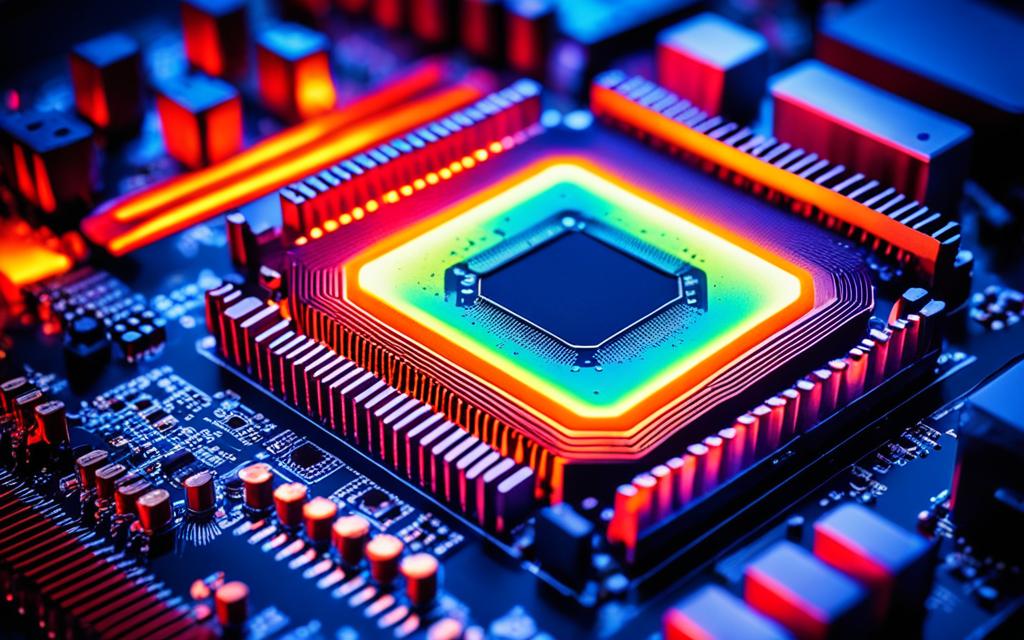Table of Contents
Is it safe for your CPU to reach 80°C? This is a critical question for anyone using computers. Most new processors can handle high temperatures. But, staying at 80°C often could shorten your components’ life. It’s key to keep your CPU cool, especially if it heats up during tasks like video editing or gaming. These activities can push your CPU to 80°C. This shows the importance of good cooling and keeping an eye on temperatures to avoid CPU overheating.
Going over 80°C can cause your CPU to slow down, a problem called thermal throttling. Keeping your CPU at a safe temperature boosts performance and hardware health. For tips on how to control your CPU’s heat, check out this guide on CPU temperature management1.
Key Takeaways
- 80°C is manageable for modern CPUs during intensive tasks but requires monitoring.
- Regular CPU temperature checks are essential for longevity.
- Keeping idle temperatures below 50°C is recommended.
- Effective cooling solutions can prevent overheating risks.
- High temperatures may indicate underlying cooling issues.
Understanding CPU Temperatures and Their Significance
Keeping an eye on CPU temperatures is key to keeping your computer running well. Knowing the normal temperature ranges helps manage CPU health. This avoids getting too hot, which can harm your computer.
Checking your CPU’s heat is vital for its care. Too much heat affects how your computer works. Regular checks help keep it stable.
The Importance of CPU Temperature Monitoring
It’s crucial to monitor CPU heat to keep your computer in top shape. A well-maintained CPU, under 80°C, works better and lasts longer. If not watched, overheating can damage your computer.
Common CPU Temperature Ranges During Use
CPU temperatures change depending on what you’re doing. When not much is happening, they stay between 30°C to 40°C. With more load, like when playing games, they can reach 60°C to 70°C.
High-demand activities might push temperatures to 80°C. It’s best to keep them lower for the best performance23. Intel processors shouldn’t be over 85°C to avoid damage4.
What Factors Influence CPU Temperature?
Factors affecting CPU temperature include the room temperature, how well your case moves air, and cooling system effectiveness. Dust or not enough thermal paste can block cooling. Hard tasks make the CPU hotter. This shows why good cooling is needed to keep things running smoothly.
What is Considered a Normal CPU Temperature?
Knowing the right CPU temperature helps keep your computer running well. Each CPU is made to work within specific limits. This keeps it efficient and long-lasting. The normal CPU temperature varies under different conditions. Regular checks are important.
Idle vs. Load Temperatures
CPUs have different temperatures based on their activity level. When idle, they should stay under 50°C. But, when working hard, they can reach between 40°C and 80°C. If they go over 80°C, there could be performance issues and possible damage, especially with intense use like gaming56.
Identification of Safe Operating Conditions
Knowing what temperatures are safe for CPUs is key. At rest, they should be between 30°C and 40°C. Under heavy use, up to 75°C is normal7. It’s vital to use cooling methods and check temperatures often. This lowers the chance of your CPU getting too hot.
Distinguishing Between Normal and High Temperatures
Understanding the right temperature range is crucial for a stable system. Most CPUs are okay up to 80°C. Yet, staying under this is safer57. It ensures the best performance and extends the life of your computer. Frequent temperature checks help spot problems early. This lets you act quickly to prevent overheating.
Is 80°C Safe for CPU? An In-Depth Analysis
It’s key to know how hot CPUs can safely get. Modern CPUs are made to handle up to 100°C. Intel says staying under 80°C is best for good performance8. Keeping it cooler is safer, as higher temps can be risky even if they’re okay for short times.
Understanding the Thermal Limits of Modern CEOUs
Each CPU type has its own heat limits. For example, Intel’s Core i7 starts slowing down at 100°C because of its Thermal Design Power (TDP) of 130W9. Normally, CPUs work between 60°C and 80°C when under a lot of stress. Some high-end ones can handle this without immediate problems10.
Potential Risks of Operating at 80°C
There are big risks if your CPU often hits 80°C. Staying this hot can harm the CPU permanently10. Also, for every 10°C over the limit, the CPU’s life can shorten by 10-20%10. Over 90°C, CPUs slow down to avoid damage, which is annoying and reduces performance8.
Some users have put their CPUs through tough tests, making them reach 85°C. Yet, normally, CPUs stay cooler than 60°C8. A good cooling system is crucial. Some have dropped their CPU heat from 83°C to 76°C by switching coolers8.
How to Monitor Your CPU Temperature Effectively
It’s crucial to keep an eye on your CPU temperature to maintain performance and avoid overheating. There are different ways to check your CPU temperature, and each has its own benefits. Using these methods together, you can make sure your system stays cool.
Methods for Checking CPU Temperature
One easy way to monitor your CPU temperature is through the BIOS interface when you start your computer. This gives you immediate temperature readings but requires rebooting your system. For a smoother experience, you can use third-party CPU temperature monitoring tools. These let you watch temperatures without stopping your work. Infrared thermometers offer quick checks of the surface temperature, providing a good alternative to software.
Recommended Software and Tools for Monitoring
To monitor your CPU temperature well, consider using programs like Core Temp and HWMonitor. They are easy to use and provide real-time information. You can keep an eye on how hot your CPU is easily. Choosing software that doesn’t heavily load the CPU is best for constant monitoring. This ensures your computer runs smoothly. Regular use of these tools helps keep your system healthy and prevents overheating.
| Software | Features | Platform |
|---|---|---|
| Core Temp | Real-time temperature readings, simple interface | Windows |
| HWMonitor | Comprehensive monitoring of various components | Windows |
| Speedfan | Temperature management, fan speed control | Windows |
Knowing how your CPU handles heat helps keep your computer stable. Good thermal management stops sudden shutdowns and extends your hardware’s life. It’s important to choose the right CPU monitoring tools.
Being informed about your CPU’s heat levels is key to good performance. It ensures temperatures stay safe. For more tips, check out resources on how to check CPU temperature11.
Conclusion
Wrapping things up, it’s generally okay to run a CPU at 80°C, especially for gaming. CPUs today can handle up to 90-100°C without harm. This shows how vital managing CPU temperature is12. Even though 80°C is safe, keeping an eye on the temperature is key. Long-term high heat can wear out your CPU, affecting its speed and life5.
To keep your CPU in top shape, try to keep it cooler than 70°C. This helps it work better and last longer5. Stopping overheating requires good airflow, a top-notch CPU cooler, and regular cleaning13. Knowing about CPU temperatures lets users protect and boost their computer’s performance.
Staying under the best temperature range boosts your CPU’s efficiency and protects your tech13. Adopting these steps leads to a strong, dependable computer setup. This lets you tackle demanding tasks while keeping your system safe and sound.
FAQ
Is 80°C considered a safe operating temperature for my CPU?
Yes, modern CPUs run well up to 80°C. But, constant high temps may shorten your components’ life. They can also cause performance problems over time.
What CPU temperature should I aim for to ensure optimal performance?
For best performance, keep the CPU under 70°C during heavy use. Ideal idle temperatures range from 30°C to 40°C. During intense tasks, try not to surpass 60°C to 75°C.
How can I effectively monitor my CPU temperature?
Check your CPU temperature in the BIOS or use software like Core Temp or HWMonitor. These tools provide instant temperature readings. They help you watch your CPU’s condition.
What factors can contribute to increased CPU temperatures?
Many things can raise CPU temps, including the room’s warmth, case airflow, dust, thermal paste age, and demanding applications like gaming or video editing.
What should I do if my CPU temperature frequently exceeds 80°C?
If your CPU often heats above 80°C, inspect your cooling setup. You might need to clear dust, improve case airflow, or reapply thermal paste. Regular checks and actions help avoid overheating.
Can high CPU temperatures lead to damage?
Yes, too much heat can make your CPU slow down or even fail. To protect your CPU, monitor its temperature and use good cooling.
What are the risks associated with running a CPU at high temperatures?
High temperatures can wear out parts faster, cause hardware to fail, and reduce performance. Avoid letting your CPU get too hot for too long.
What tools are best for monitoring CPU temperatures accurately?
Core Temp, HWMonitor, and similar apps are good for checking CPU temps. They give live data and don’t stress your system too much.
Source Links
- https://community.spiceworks.com/t/what-is-a-normal-temperature-for-a-cpu-and-how-do-i-keep-it-low/948818 – What is a normal temperature for a CPU and how do I keep it low?
- https://forums.tomshardware.com/threads/is-my-cpu-temperature-safe.3725283/ – [SOLVED] – Is my cpu temperature safe?
- https://softwareg.com.au/blogs/computer-hardware/is-80c-too-hot-for-cpu – Is 80C Too Hot For CPU
- https://www.pugetsystems.com/labs/articles/impact-of-temperature-on-intel-cpu-performance-606/ – Impact of Temperature on Intel CPU Performance
- https://softwareg.com.au/blogs/computer-hardware/is-80c-safe-for-cpu-while-gaming – Is 80C Safe For CPU While Gaming
- https://softwareg.com.au/blogs/computer-hardware/is-80-c-hot-for-cpu – Is 80 C Hot For CPU
- https://www.wepc.com/cpu/faq/is-80c-too-hot-for-a-cpu/ – Is 80°C too hot for a CPU?
- https://www.overclock.net/threads/i7-860-max-safe-temps.755311/ – i7 860 Max Safe Temps?
- https://www.pugetsystems.com/blog/2009/02/26/intel-core-i7-temperatures/ – Intel Core i7 Temperatures
- https://rog-forum.asus.com/t5/rog-strix-series/temperatures-on-rog-strix-g16-g614ji-during-intense-gaming/td-p/975142 – Temperatures on Rog Strix G16 G614JI During Intense Gaming Sessions
- https://superuser.com/questions/1265417/reaching-nearly-80c-on-cpu-two-minutes-after-boot – Reaching nearly 80C on CPU two minutes after boot
- https://ms.codes/en-gb/blogs/computer-hardware/is-80c-safe-for-cpu-while-gaming – Is 80C Safe For CPU While Gaming
- https://expertbeacon.com/is-80c-safe-for-cpu-while-gaming/ – Is 80°C Safe For Your CPU While Gaming? – ExpertBeacon








